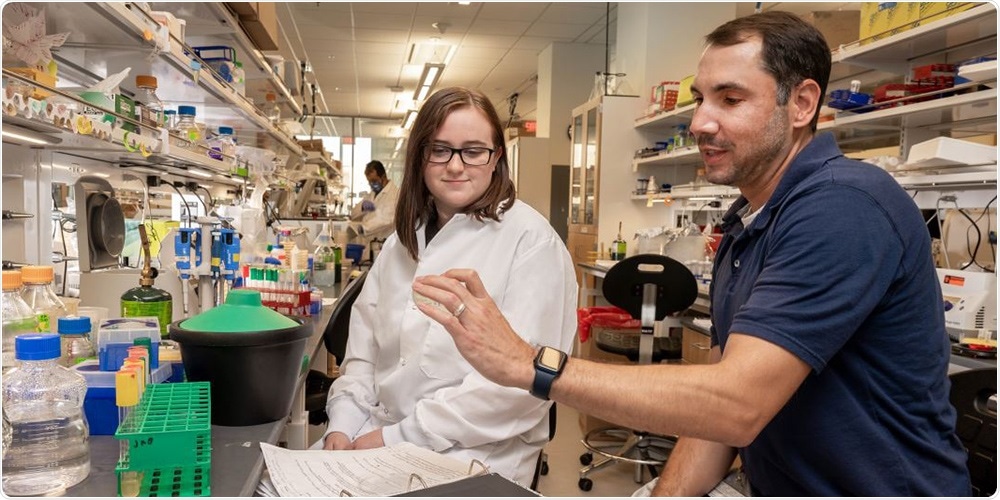Researchers anticipate that without intervention, the issue of multidrug-resistant bacterial infections could become catastrophic by 2050—resulting in the death of around 10 million individuals every year.

Hannah Bovermann, left, and Joseph Boll. Image Credit: University of Texas at Arlington.
To address this issue, the National Institutes of Health granted a five-year, $1.8 million grant to Joseph Boll, assistant professor of biology at The University of Texas at Arlington, to pinpoint and hinder the defense mechanisms of Acinetobacter baumannii—a pathogen thriving in hospital and clinical settings.
A. baumannii can induce infections in the urinary tract, blood, and lungs, or in wounds in other body parts. Infections are normally treated with antibiotics; however, numerous strains are resistant to medication—inclusive of carbapenems, a class of greatly effective antibiotics normally used for severe multidrug-resistant bacterial infections.
In previous research, we discovered that when A. baumannii experiences stress, such as antibiotic treatment, it modifies its cell envelope to tolerate the antibiotic for extended periods of time. Specific modifications allow the bacteria to survive long enough to acquire true antibiotic resistance, which can lead to antibiotic treatment failure. This can happen within 24 hours of antibiotic exposure.”
Joseph Boll, Assistant Professor, Biology, The University of Texas at Arlington
Boll’s group anticipates pinpointing the adaptations in the cell envelope that enable the survival of the pathogen in the presence of antibiotics along with identifying how survival adds to the attainment of true resistance.
The researchers revealed that two LD-transpeptidase enzymes remodel A. baumannii’s cell envelope to enhance its survival under stress—similar to the one experienced during antibiotic treatment.
The research was published in the mBio journal.
With this understanding, Hannah Bovermann, a senior double-major in biology and microbiology, analyzed genes that encode the bacteria’s LD-transpeptidases to investigate the stress conditions that trigger their activation.
Bovermann isolated the LD-transpeptidase promoters—the part of the DNA that regulates when the other parts of DNA are used—and glued it to a diverse gene that turns the bacterial cell blue. The cell when encountered with an environment where it needs to alter its cell envelope to safeguard itself, the cell turns blue. This would help Bovermann observe the timing of the change.
To induce the reaction, Bovermann administered antibiotics, experiments with different temperature changes, exposed the cell to pH gradients, and subjected the cell to nutrient deprivations.
Each response brings us closer to an understanding of how cell envelope modifications keep the bacterial cell intact in stress.”
Hannah Bovermann, Department of Biology, University of Texas Arlington
The scientists anticipate identifying novel targets on the surface of the cell for antibiotics to attack, enhancing existing medications’ potency against A. baumannii infections.
Boll remarks that drug-resistant bacteria have cornered medical practitioners into utilizing combinatorial therapies—using multiple drugs to treat bacterial infections—however, those methods to are becoming increasingly inefficient.
It has become a game. Researchers discover a new antimicrobial, then bacteria become resistant to it. We are running out of options. Bacterial resistance is quickly outpacing new antibiotic development.”
Joseph Boll, Assistant Professor, Biology, The University of Texas at Arlington
Source:
Journal reference:
Kang, K. N., et al. (2021) Septal Class A Penicillin-Binding Protein Activity and ld-Transpeptidases Mediate Selection of Colistin-Resistant Lipooligosaccharide-Deficient Acinetobacter baumannii. mBio. doi.org/10.1128/mbio.02185-20.